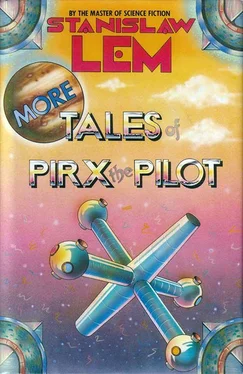“Mr. Rahaman?”
“I’m not very up-to-date on this program.”
“But you’re familiar with the model?”
“I am.”
“Failing any external cause, what could have interrupted the landing procedure?”
“Nothing.”
“Nothing?”
“A bomb planted under the computer, maybe…” said Rahaman.
Out in the open at last; Pirx was all ears now. The exhaust fans whirred as smoke clustered around the ceiling vents.
“Sabotage?”
“The computer functioned till the end, though erratically,” observed Kerhoven, the only locally stationed intellectronics engineer on the committee.
“Well, I only mentioned it for what it may be worth,” said Rahaman, backing off. “In the case of a normally functioning computer, the landing and lift-off maneuver can be aborted only by something out of the ordinary. A power failure…”
“Power there was.”
“But, theoretically, can’t a computer abort the procedure?”
The chairman knew well enough that it could. Pirx understood that his question was not addressed to them, but was for the benefit of Earth.
“In theory, yes. In practice, no. Not once in the history of astronautics has a meterorite alarm been sounded during a landing. When a meteorite is sighted, the landing is simply postponed.”
“But none was sighted.”
“No.”
A dead end. There were a few moments of silence. The fans purred. Darkness showed through the round ports. A Martian night.
“What we need are the people who constructed that model, the ones who test-loaded it,” Rahaman said at last.
Hoyster nodded. He was distracted by a message handed him by the telegraph operator. “They’ll be reaching the cockpit in an hour or so,” he said. Then, looking up, he added: “Macross and Van der Voyt will take part in tomorrow’s session.”
There was some commotion. Macross was the chief engineer and Van der Voyt the managing director of the shipyard whence the hundred-thousand-tonners came.
“Tomorrow?” Pirx couldn’t believe his ears.
“Not live, of course—but by video, thanks to a direct relay. Here’s the cable.” He waved the telegram.
“Hold on—what’s the time lag?” asked someone.
“Eight minutes.”
“What’s the big idea? We’ll have to wait a lifetime for every answer,” someone asked, in a clamor of several voices at once.
Hoyster shrugged.
“We’ll have to comply. Granted, it’ll be a nuisance, but we’ll work out something…”
“Does that mean we’re adjourning till tomorrow?” asked Romani.
“Right. We’ll reconvene at 0600 hours. By then we should have the on-board tapes.”
Pirx gladly accepted Romani’s offer to put him up for the night. He wanted no part of Seyn. Though he understood the man’s behavior, he couldn’t condone it. Accommodations were found for the Syrtisians—not without some difficulty—and by midnight Pirx was left all alone in the tiny cubicle that served as the coordinator’s reference library and private study. He lay down, fully dressed, on a cot set up between several theodolites, and, with his arms under his head, stared up at the ceiling, eyes fixed, barely breathing.
It was odd, but, being among strangers, he had been viewing the accident as an outsider, as one of the many witnesses not really involved, even when he had detected the hostility, the irritation in their questions—an unspoken accusation directed at the intruder out to show up the local boys—and when Seyn had turned against him. This was another realm, fixed in the natural dimension of the inevitable: under the circumstances it had had to happen. He would defend what he’d done, on rational grounds; he held himself in no way responsible for the disaster. True, he’d been shaken, but he’d kept his head, always the observer, never entirely overwhelmed by events because of the way they lent themselves to systematic analysis: for all their inexplicability, they could be sifted, categorized, posited according to the method dictated by the solemnity of the investigation.
Now all that was giving way. His mind was a blank, he evoked nothing, the images reasserted themselves on their own, from the beginning: the monitors, the ship’s entry into the Martian atmosphere, the deceleration from a cosmic velocity, the shifts in thrust; he was everywhere at once—in the control tower, in the cockpit; he knew the muffled strokes, the rumbling along the keel and ribs when the atomic drive gave way to the pulsating boron hydrides; the deep, reassuring bass of the turbo-pumps; the reverse thrust, the axial descent, stem first, majestically slow; the slight lateral corrections, and then ignition, the thunderous roar accompanying the sudden shift in thrust when full power was restored to the nozzles; the vibrations, the destabilization, the frantic effort to keep on an even keel, swinging pendulously, teetering like a drunken tower, before going into a dive, inert, rudderless, blind, a stone, disintegrating on impact—and he was everywhere. He might have been the struggling ship itself, and, though painfully aware of the hopeless inaccessibility, the finality of what had happened, he returned to those fragmentary seconds with a silent, unremitting question in search of the cause.
Whether or not Klyne had tried to man the controls didn’t matter any more. Ground control? Clean. Only someone very superstitious or trained in soberer times could have begrudged them their fun. Reason told him there was nothing sinful about it. He lay there, flat on his back, but at the same time he was standing by the window pitched toward the zenith, watching as the flickering green boron star was consumed by that awesome solar blaze—with its pulsation so typical of atomic power—in the nozzles, which had already begun to cool (hence the restrictions against sudden shifts to full throttle); still watching as the ship swung like the tongue of a bell rocked by a madman’s hands, listing with the entire length of its behemoth body, its very dimensions, the very force of its magnitude making it seem immune to danger—a century ago, the passengers of the Titanic must have felt similarly comforted.
Suddenly it receded; he was awake. He got up, washed his face and hands, opened his grip, got out his pajamas, slippers, toothbrush, and for the third time that day eyed himself in the washbasin mirror. He saw a stranger.
In his late thirties, pushing forty: the shadow line. Time to accept the terms of the unsigned contract, there without the asking; the knowledge that what binds others applies to you, too, that there are no exceptions to the rule: though it was contrary to nature, one had to grow old. So far, only the body was secretly obeying, but that wasn’t enough any more. Now one had to assent to it. Youth made its own unalterability the rule, the basic premise: I was childish, immature, but now I am my true self, and that’s the way I’ll stay. This was the joke at the very heart of existence, whose discovery was more a cause of amazement than of alarm—a sense of outrage born of the realization that the game we’ve been forced to play is a hoax. The contest was to have been different; after the initial shock, the anger, the resistance, came the slow negotiations with one’s self, with one’s body: no matter how smooth and imperceptible the aging process, we can never reconcile ourselves to it rationally. We brace ourselves for thirty-five, then forty, as if it were to last, and with the next revision, the shattering of illusion is greeted with such resistance that the momentum makes us overstep the bounds.
That’s when a forty-year-old begins to adopt the mannerisms of an old man. Resigned to the inevitability of it, we carry on the game with grim determination, as if perversely bent on upping the ante: all right, if it’s to be dirty, if this cynical, cruel promissory note, this IOU, has to be honored, if I really have to pay, then even though I never agreed to it, never asked for it, never knew, there’s your debt, and more! Comical as it sounds, we try to outbluff our opponent: I’ll grow old so damned fast you’ll be sorry. Stuck at the shadow line, or almost across it, in the phase of abandoning and surrendering positions, we keep up the fight, keep on defying reality, and because of the constant scrimmaging we grow old psychically by leaps and bounds. Either we exaggerate or we underrate, until one day we see, too late as usual, that this fencing match, all these suicidal thrusts, retreats, and sallies, were also a joke. We are like children, withholding our approval of something for which our assent was never required, where there can never be any protest or struggle—a struggle, moreover, rooted in self-deception. The shadow line is not a memento mori but is in many respects worse, a vantage point from which to see our prospects diminished. That is, the present is neither a promise nor a waiting room, neither a preface nor a springboard for great hopes, because the terms have been imperceptibly reversed. The so-called training period was an irrevocable reality; the preface—the story proper; the hopes—fantasies; the optional, the provisional, the momentary, and the whimsical—the true stuff of life. What hasn’t been achieved by now will never be; and one has to reconcile oneself to this fact, quietly, fearlessly, and, if possible, without despair.
Читать дальше












